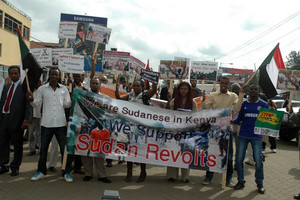Kenya: Sudanese Citizens Hold Demo at Embassy
By Elisha Ratemo
 NAIROBI--Sudanese citizens in Kenya Friday held protests against the ongoing crackdown in Sudan by the government on protesters opposing austerity measures and human rights violations. The group, numbering hundreds, held peaceful protests Friday afternoon outside the Sudanese embassy in Nairobi where they presented a petition to the Sudanese ambassador to Kenya, about their concerns over the ongoing protests in Khartoum.
NAIROBI--Sudanese citizens in Kenya Friday held protests against the ongoing crackdown in Sudan by the government on protesters opposing austerity measures and human rights violations. The group, numbering hundreds, held peaceful protests Friday afternoon outside the Sudanese embassy in Nairobi where they presented a petition to the Sudanese ambassador to Kenya, about their concerns over the ongoing protests in Khartoum.
“We strongly refuse and object to the hard way this regime is facing the peaceful demonstrations in the face of hunger and human rights abuses that are taking toll in Sudan”, read a statement they presented to Sudanese envoy Kamal Ismail.
President Omar al-Bashir mid-last month announced a new austerity plan in an attempt to address the economic inflation that has since seen a cut in a number of civil servants and an increase of almost double in fuel price. The economic meltdown has been witnessed since South Sudan seceded a year ago, causing loss in oil revenue.
Outside the embassy, protesters carried placards reading “we support Sudan revolt” as they chanted along “Al-Bashir to ICC” slogans both in English and Arabic. Mr. Ismail who later met with the protestors said that he shall ensure that their petition reaches the government in Sudan.
The statement cited various reports that have confirmed widespread rights violations by the government in several parts of Sudan which have in recent past escalated in the four weeks of street protests.
“There have been wide-spread human-rights violations in Darfur, South Kordofan and Blue Nile States, as well as in other regions…arbitrary arrests, NGOs expulsions, extra-judicial Killings, unfair
trials, coordinated attacks against South Sudanese citizens, it said.
“We came here to support our brothers back home, to condemn the behaviour of the
Sudanese government and demand end this violent crack down on peaceful protests,” said
Mohammed Osman, one of the protesters who read the petition to reporters.
We also came here to demand an end to war in South Kordofan, Blue Nile and Darfur. We are against wars, corruption, consolidation of power and wealth, and we support the revolt back in Sudan to end the regime of president Bashir, added Osman.
The Khartoum government since South’s independence last July has engaged in a military operation in states on the contested border region to root out rebels who where allied to now the South’s national army during the civil war. This has led to indiscriminate aerial bombardment in civilian held
areas in the Nuba Mountains that has claimed thousands of lives, and forced
thousands others to flee.
The protesters have likened the ongoing street protests which also now are demanding for an end to Bashir’s 23-year old regime, as being on the footsteps of the October 1964 and April 1985 revolutions which succeeded in deposing governments of then. Bashir who came into power through the 1985 blood-less coup has down played the demonstrations as small-scale and not comparable to the Arab Spring uprisings in Egypt and elsewhere, maintaining that he himself remains popular.
The protesters in their deep concern have called upon the Bashir government to stop all forms of rights violations and to repeal all legislations that curtail and limit human rights. They also called upon the government to end its military campaigns against unarmed citizens in all conflicting areas in Sudan.
Bashir is wanted by the ICC for war crimes and crimes against humanity committed in Darfur since 2003 where at least 300,000 people are said to have died but the government places the death
toll at 11,000.
Both Sudans accuse each other of supporting rebels on the other side of the border, resulting in a gridlock in talks that sought to settle outstanding issues including possible border region and
sharing of oil resources.
The landlocked South Sudan took most oilfields in the breakaway but depends on the pipeline in the
north to transport its crude to ports for export. In January Juba said it was shutting down its
oil production over a transit fee row with the north, accusing it of stealing its crude.



